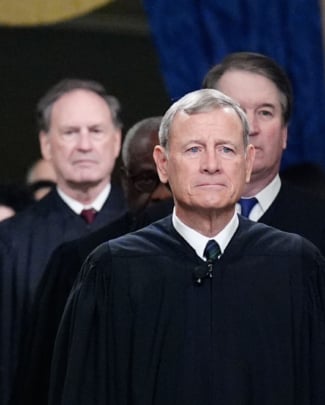SCOTUS TO DETERMINE IF GOVERNMENT CAN TAKE YOUR GUNS
PLANNED PARENTHOOD’S EVIL NEW GIG
WHO AGREES WITH CHINA’S NARRATIVE THAT COVID DIDN’T BEGIN IN WUHAN LAB
ARMOR UP—THE BATTLE BELONGS TO THE LORD
“INTERCEDE IT”- THEN GO FOR THE GOAL!
SCOTUS TO DETERMINE IF GOVERNMENT CAN TAKE YOUR GUNS
In a case that could have wide-ranging effects on policing in America, the United States Supreme Court will hear arguments next month to decide if police can make warrantless searches of a private residence under the “community caretaking” doctrine.
FPC and FPF announce the filing of an amicus brief with the United States Supreme Court in the case of Caniglia v. Strom, a case about whether a “community caretaking” exception to the Fourth Amendment’s warrant requirement extends to the home. https://t.co/y9vgTtdiHJ
— Firearms Policy Coalition (@gunpolicy) January 15, 2021
. . .Before a police officer or other government official can enter a private home, they must show a judge probable cause that an item is present and that a crime has been committed.
If the judge finds there is sufficient probable cause, a search warrant is issued.
There are widely-accepted exceptions, called “exigent circumstance,” for emergency situations. . . .
Have you been following Caniglia v Strom, a Fourth Amendment case? You probably should. #scotus #2A #secondamendment #guns #fourthamendment #warrantlesssearchhttps://t.co/5XWFcwLcUT
— The Truth About Guns (@guntruth) January 27, 2021
Other than these exigent circumstances, the courts have also defined a “community caretaking” doctrine to the Fourth Amendment when it comes to policing.
In the Supreme Court case of Cady v. Dombrowski, the court held that under certain circumstances, the police may search a motor vehicle without first obtaining a warrant if they are engaged in a “community caretaking” function, meaning a duty wholly divorced from the investigation of a crime or the enforcement of criminal laws. . . .
The Supreme Court said the “community protection” exception did not violate the Fourth Amendment because:
“(Police perform) community custody functions, totally separate from detection, investigation or acquisition. evidence relating to the violation of a criminal law.”
The “community caretaking” doctrine was not limited by the court to emergency situations like exigent circumstances are. If the officer has “reasonable” cause to believe there is a danger to the community, a warrantless search is permissible.
SCOTUS grants cert in a 4A case, Caniglia v. Strom, 19-1764, on the community caretaking exception to the warrant req. And implicitly about how willing the Court should be to adopt non-law-enforcement reasonableness standards vs. a warrant requirement.https://t.co/mrv5iw1y2k pic.twitter.com/kBJp1Vjc2c
— Orin Kerr (@OrinKerr) November 21, 2020
The Constitutional Accountability Center pointed out that the ruling in Cady v. Dombrowski has been widely interpreted by lower courts to allow room for the application of the exception in a private home:
“The Court made clear, however, that the exception applied only to motor vehicles and did not extend to people’s homes. Despite the clear line drawn by the Court, numerous lower courts have extended the community caretaking exception to allow warrantless entries into, and seizures from, people’s homes.”
In the case of Caniglia v. Strom, the Supreme Court is considering whether the “community caretaking” exception to the Fourth Amendment’s warrant requirement should extend to the home. The Supreme Court is scheduled to hear arguments next month. . . .
The case involves Cranston, Rhode Island residents Mr. and Mrs. Caniglia. The couple was arguing inside their residence, and the husband put an unloaded handgun on the kitchen table and told his wife, “shoot me now and finish this.”
The wife called the police, and when they arrived, the police convinced the husband to go to the hospital by ambulance for a crisis evaluation. The wife then told police that her husband kept two guns in the home.
Police conducted a warrantless search of the home. . . .
Police located and seized both firearms.
Thanks to YOUR support, we filed an amicus brief at the United States Supreme Court in Caniglia v. Strom, a case about whether a “community caretaking” exception to the Fourth Amendment’s warrant requirement extends to the home. You can read the brief at https://t.co/9IQbagn6Ce! pic.twitter.com/Zqhrfp3xsV
— Firearms Policy Coalition (@gunpolicy) January 24, 2021
. . .When Mr. Caniglia tried to pick up the weapons, he was told it was department policy not to return weapons without a court order. . . .
NEW: Caniglia v Strom (1st Circuit): Opinion
"We hold today — as a matter of first impression in this circuit — that this measure of protection extends to police officers performing community caretaking functions on private premises (including homes)."https://t.co/wbjj2kVdgN pic.twitter.com/n4mtnJAA7v
— Rob Romano (@2Aupdates) March 13, 2020
The federal district court agreed the department policy was unconstitutional but ruled the warrantless search and seizure was lawful under the “community caretaking” exception. The Federal Court of Appeals upheld the ruling.
In siding with police, the Federal Court of Appeals said:
“At its core, the doctrine of community protection is designed to give police the flexibility to take appropriate action when unforeseen circumstances present a transient risk that requires immediate attention.
“Understanding the main object of the doctrine leads inexorably to the conclusion that it should not be limited to the context of the motor vehicle. Threats to individual and community safety are not limited to highways.” . . .
Mr. Canigilia hired Attorney Shay Dvoretzy of the law firm Skadden, Arps, Slate, Meagher & Flom as private counsel and brought the case to the Supreme Court. The court agreed to hear the case to decide whether the ‘community caretaking” exception can be applied to the warrantless search of a person’s home.
The ACLU of Rhode Island filed a “friend of the court” brief in the U.S. Supreme Court in the case, saying:
“It (The court case) raises significant issues concerning the scope of Fourth Amendment protections and police warrantless searches of the home.” . . .
Their brief also argued that an unfavorable ruling by the court would give police too much authority:
“give police free rein to enter the home without probable cause or a warrant, whenever they think it is ‘reasonable’ to do so.”
The ACLU argued in the brief that there were only two acceptable exceptions to the Fourth Amendment protection from warrantless searches:
“(The Supreme Court) has held that warrantless home entry is constitutional in just two narrow settings: consent of an occupant or exigent circumstances.
“The [lower] courts have taken a doctrine developed for the reduced expectation of privacy associated with impounded vehicles, and applied it to the home, the apex of privacy, without justification.” . . .
In a brief filed by the respondents, Attorney Marc DeSisto wrote:
“Courts routinely allow officers to enter a residence without a warrant if the circumstances are dire and the officers’ actions are both limited and based on sound police procedure.
“Even the few decisions that have declined the application of the community caretaking doctrine to private property recognize that police officers can—and should—respond to urgent situations in the home involving the potential for violence or injury without being required to obtain a warrant.”
The brief said that the argument is especially true if there are no criminal consequences to the search:
“Numerous courts have allowed warrantless entry to keep the peace, some under the name of ‘community caretaking’ and several employing the ‘exigent circumstances’ or ‘emergency aid’ exceptions. Neither of the latter two exceptions precisely fit the unique circumstances of this case, but it is the legal theory, and not the nomenclature, that must carry the day.” . . .
The brief wrote:
“While recognizing the difference between an automobile and a home, this Court did not limit Cady to automobile searches. Rather, it simply applied the community caretaking concept to the facts before it. The Fourth Amendment does not prohibit law enforcement officers from diffusing a volatile situation in a home to protect the residents or others.”
The respondents ended their brief by saying the lower court’s ruling did not give police unrestrained authority to conduct warrantless searches but gave them the ability to save lives:
“The First Circuit did not give law enforcement carte blanche to search a home for contraband or weapons. Rather, the First Circuit established clear, constitutionally sound guidelines for law enforcement given the unique facts of this case, where no criminal charges were brought and where a focused search and seizure ensured that a dangerous situation had been averted.” . . .
The Supreme Court has scheduled case arguments for March 24, 2021. Law Enforcement Today will follow the case and provide updates as the court case develops.
(Excerpt from Law Enforcement Today. Article by Scott A. Davis. Photo Credit: Unsplash.)
What do you think about this case? Share in the comments below!
Partner with Us
Intercessors for America is the trusted resource for millions of people across the United States committed to praying for our nation. If you have benefited from IFA's resources and community, please consider joining us as a monthly support partner. As a 501(c)3 organization, it's through your support that all this possible.


We use cookies to ensure that we give you the best experience on our website. If you continue to use this site we will assume that you are happy with it. Privacy Policy





Comments
I am led to pray that the Father will block he attempt for lawlessness to have their way but allow the “sound reasoning” of legitimate law enforcement officers that care about protecting their community so “All men everywhere” live in Peace be fulfilled. Protection of the Police and First Responders which now include Social Workers in some places is included. This comes from Psalm 91 and I extend that to a Decree that the Angelic Host from now until Jesus comes be present in every one of these situations. Amen.. I lift up the Name of Jesus that His will be done on Earth as in Heaven over every political party and attitude that might interfere with Justice being done in this country.
Saints…stay on your knees, stay focused, trust GOD, read your Bible… and your Constitution… know your rights, read about the revolutionary war, why it happened, the outcome, and DO NOT ALLOW YOURSELVES TO BE BULLIED! DO NOT LET GO OF YOUR ARMS BY NO MEANS! Study the enemies of us and our LORD and WATCH and PRAY! The people in charge have read Marx and Lenin and Hitler and before those dictators’ takeovers, the first thing they did was confiscate guns and weapons. As citizens we need to find out if we can impeach the Supreme Court members that won’t do their jobs which is to interpret the laws and the Constitution! Period! For years GOD had me studying all I could about Hitler and Nazi’s and Socialism and Communism and I could not understand why! NOW I DO! Germany and Russia and all of the socialist and communist countries WEREN’T ANYTHING LIKE THE USA! They were already mostly godless! We aren’t! If we stay focused and on our knees, we will be Victorious by our LORD AND SAVIOUR JESUS CHRIST! In the MIGHTY NAME of JESUS! FATHER GOD please strengthen YOUR people in their inner man and let us stand strong in YOUR NAME! Please send Michael the Archangel to lead YOUR warring angels to fight in this battle for us as YOUR WORD tells us that “we will not need to fight in this battle, but to stand still and see the salvation of the LORD with you,” 2 Chronicles 20:17. In JESUS MIGHTY Name! Amen!
Put your weapons in a “very secure location” known only to you and your family!
Suzie,
Many preachers and teachers say that America is not in the Book of Revelation. That is somehow ceases to be. So how would your “…we will be victorious” fit into this? Are we putting off the inevitable and just buying time?
I don’t ask this to be discouraging. It’s just that there are two camps saying different things. One is to save America and that God will do this and another saying that America is going to fall.
So what are we to do about these conflicting messages?
This is a total misunderstanding of this supreme court case. The author is definitely deceived here.
I did not even to attempt to read most of this- it seems to be another case of one law leading to another which somehow violates our right to have guns.
Can someone please give a summary statement that does not include interruptions by other sources.
I pray someone will be able to rightly interpret what is rightly going on and properly and effectively defend any personal rights being infringed upon.
If they do I thank them and commend them for their ability and courage.
The issue is what circumstances police have the right to search a private home without a warrant signed by a judge. When they saw the gun they seized both guns from the home and said a court order was needed to recover them. This paves the way for police to seize guns without warrants. You can liken it to calling the police over a domestic dispute and they enter and remove your televisions. Not lawful.